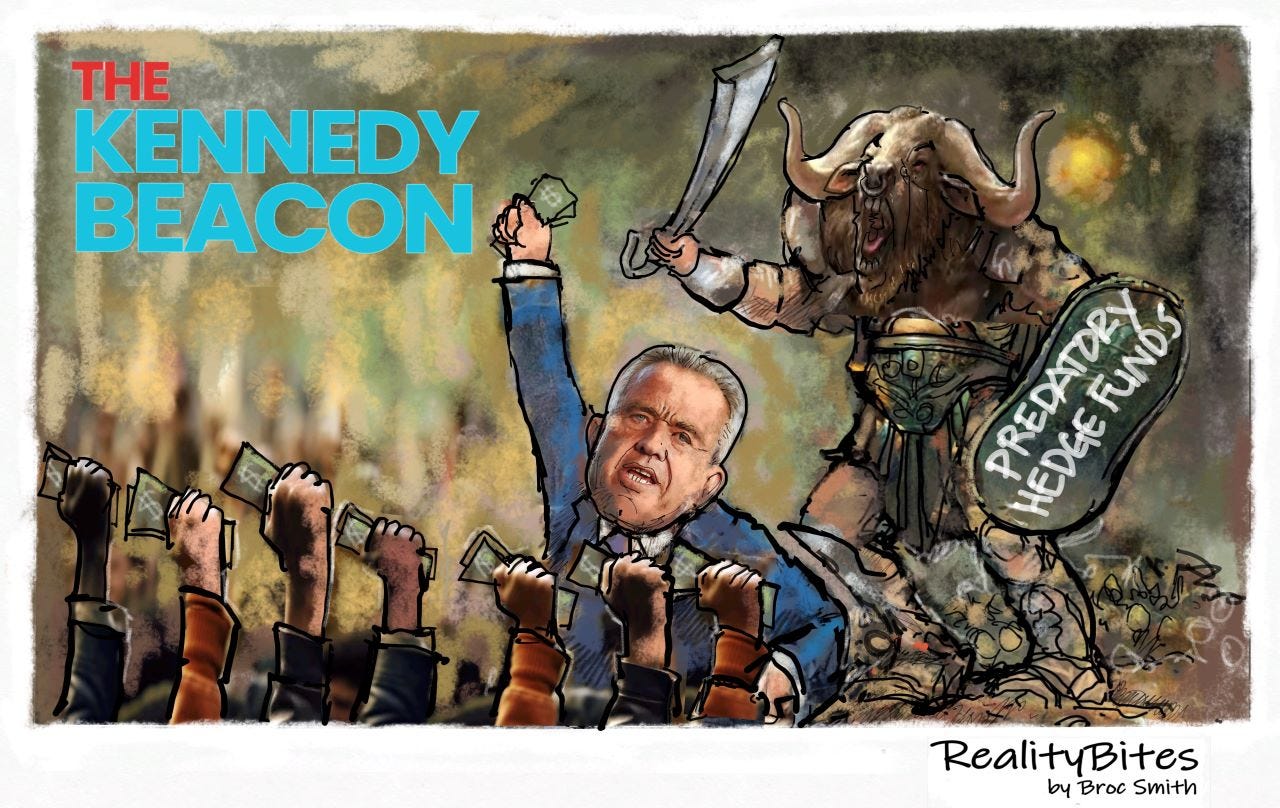by Adam Garrie, The Kennedy Beacon
Robert F. Kennedy Jr. backs young retail investors who challenged the strategies of some predatory Wall Street investors and revised notions of the financial literacy of young Americans.
By offering his stalwart support and putting his own money on the line to hold a position in a so-called “meme stock,” Kennedy has given a voice to young retail investors who have embraced Wall Street as their unique road to the American Dream. These rebels are doing so at a time when the routes preferred by previous generations have been largely cut off.
The young retail investors are also looking to democratize the stock market.
To achieve this outcome, they have long sought a political ally amid allegations that the SEC regulations and enforcement mechanisms are biased in favor of institutional over retail investors.
Because of their spirit of perseverance and loyalty regarding the stocks of their choice, some young retail inventors began referring to themselves as “apes.” This was particularly true of investors in the movie theater chain, AMC. The company embraced the terminology and even issued preferred stock whose ticker symbol was “APE.”
Taking to X, where influencer Keith Gill (aka Roaring Kitty), one of the movement’s leaders, recently reemerged after a long hiatus, Kennedy said,
I’m very aware of what the average retail investor has been saying about the need for greater transparency in our markets, stronger regulatory oversight and tougher penalties for market manipulation and criminal behavior. My administration will support the Ape retail rebellion and enact aggressive Wall Street reforms. To match action with words, I just invested $24,000 in GameStop from the fees I earned from suing Monsanto for their knowingly poisoning our soil and causing cancer. I love the idea of making Monsanto support $GME and the Apes. We need a free and fair market. Let’s punish predatory short selling to the moon. By the way, I ride with you and I’m not leaving.
What Are Young Retail Investors Up To?
In 2020, many Americans invested in the stock market for the first time. While these young investors filled their portfolios with a variety of stocks, two stood out – GameStop (the world’s largest video game retailer) and AMC. When Covid shutdowns took place, conventional wisdom said that these companies, a brick-and-mortar video game chain and the country’s largest movie theater chain, would not survive the lockdown.
Roaring Kitty realized that major institutional investors wished to profit from the demise of GameStop, which he said was undervalued and therefore represented an opportunity for retail investors to profit from the resurrection of a doomed company.
Indeed, the share price of these companies fell in the early months of shutdowns, and many institutional investors began to bank on the failure of such companies through shorting the stock. Short selling is an investment strategy whereby an investor borrows shares with the intent of immediately selling them and then buying them back at a lower price in order to return them to the lender and profit the difference. This strategy only works if one can accurately predict the decline of a specific stock at a specific time. But many first-time retail investors saw this as an opportunity to group together and influence the market by sending these stocks “to the moon.”
In January of 2021, GameStop’s share price rose 1,500%.
The buying spree by retail investors led to major losses at a number of hedge funds. On January 28, 2021, during the height of this “short squeeze,” the trading platform Robinhood, which was a preferred platform of these young traders, restricted the buying of GameStop stock and allowed only the selling of the stock, apparently to keep the price low and to save the hedge funds. Robinhood faced litigation from retail investors who felt that this violated securities regulations. In a ruling from 2023, the US Court of Appeals for the Eleventh Circuit sided with Robinhood. This was seen by many retail investors as an example of regulation enforcement not being consistent with the interests of the small investor going up against major corporate entities.
Early 2021 also saw similar trends regarding AMC’s share price. CEO Adam Aron credits the retail investors with saving the company and began engaging directly with them on Twitter (now X). The AMC retail investment community is collectively known as AMC Apes – a term that has been wholly embraced by the company. X, Reddit, and other social media platforms are filled with memes celebrating the investment subculture that has sprung up around the Apes.
This new investor class, dubbed “Generation Investor (Gen I)” by a Charles Schwab report, is far from being a movement relegated to social media: “Amidst a global pandemic, economic uncertainties and market volatility, a new generation of investors was born: 15 percent of all current U.S. stock market investors say they first began investing in 2020, according to a new Schwab survey.” The survey further said, “Gen I earns about $20,000 less in annual income, at $76,000 per year, and half (51 percent) lives paycheck to paycheck. Gen I also had some hurdles to overcome in order to get invested, with more than 60 percent saying the pandemic had a financial impact on them.”
Democracy Meets Wall Street
The retail investors who bought their first stock in 2020 are very vocal about the need for greater transparency from Wall Street and the US Securities and Exchange Commission (SEC).
According to Gallup polling data cited by the financial news site FinanceBuzz, 39% of Americans ages 18 to 29 own stock, which is around 25.74 million people. While some in this cohort will be enthusiastic Apes and others will be more casual investors, Kennedy’s promise to protect their interests and give them a voice in Washington is an important asset to both.
Following Gill’s self-reported disclosure that he acquired 5 million shares in GameStop on June 2, the company’s share price continued to rocket, forcing multiple trading halts. Gill’s new stake makes him a 1.8% owner of the company he has long championed. Fellow so-called “meme stock” AMC was also significantly higher following Gill’s disclosure. Gill appeared to make $85 million since taking his latest stake in GameStop.
Days later, Reuters reported that the Massachusetts securities regulator was investigating Gill’s trades, although no specific reasons as to the nature of the investigation were provided. This has added to concerns among young retail investors that regulators that should be safeguarding their trades are instead attempting to make life more difficult for non-professional stock traders.
For his part, Kennedy has pledged to address these and related issues if elected in November.








Thanks for the clarity in this article and explaining more reasons for previous generations to back RFK.
the return to fairness and concern for everyone’s future! particularly the YOUNG is paramount. It’s a new world. It’s their world but we all can and should support young people starting out.
Great summary! TY